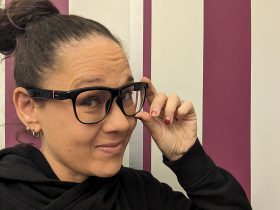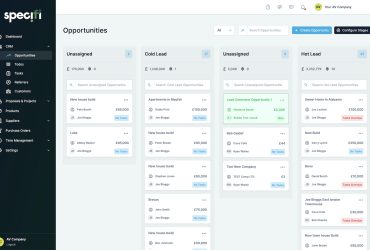The latest candidate in our series of Q&As with influential women in the technology business in Canada is Karishma Punwani, Director of Academic Product Management, Maplesoft, the company behind a powerful math engine used by everyone from educational institutions to research labs, NASA, and the Canadian Space Agency.
Name: Karishma Punwani
Job Title: Director of Academic Product Management at Maplesoft
Years in the Industry: 12+ Years
The Quote That Most Inspires You: Not quite a quote but the poem “What if I Fall?” by Erin Hanson lifts me up every time I see it.
What if I Fall?
By: Erin Hanson
There is freedom waiting for you,
On the breezes of the sky,
And you ask, “What if I fall?”
Oh but my darling,
What if you fly?
The poem hangs in my four-year-old son’s bedroom and every time I read it, I get teary-eyed. It speaks to me of what is possible when you have the courage to believe. And it reminds me to teach my son to be courageous in pursuing his dreams.
What drew you to a career in the consumer and/or business technology industry?
I was born and raised in Montreal to parents of Indian descent. Like most Indian parents, they “encouraged” me to pursue a career in either law, medicine, or engineering, despite my true calling to pursue a career in theatre (at least that’s what I believed it to be at the time).
So, I pursued a Bachelor’s degree in Electrical Engineering which led to a Master’s in Biomedical Engineering. While I found my Bachelor’s degree mind-numbingly boring, I loved my Master’s degree! It gave me the freedom to immerse myself wholly in a topic I found exciting and allowed me to call the shots on my schedule, which led to my involvement in student government. But apart from the research and the independence, pursuing a Master’s degree opened doors to opportunities that I couldn’t have imagined, such as an internship with the International Organization for Migration in Kenya, a job offer in Europe, and the chance to work at Maplesoft.
Have you encountered any roadblocks along the way that were related to your gender?
Unfortunately, I have encountered roadblocks, but I can’t blame gender alone. Rather, it was a combination of gender and my Indian upbringing.
One of the tenets of my household growing up was to respect your elders. While an excellent tenet to aspire to, the way it was taught had unforeseen negative consequences, which I’m sure my parents did not intend. Showing respect as a girl meant that I was not encouraged to question the authority of my elders, even if I disagreed (while I might argue, I always knew when to back down); that I always had to seek permission before taking any action; and that decisions were not mine alone to make.
As a result, when I entered the workforce, I was petrified to question decisions, especially those made by male leaders. I often held back my opinions or couched my opinion behind very selective wording. Moreover, I rarely acted without first seeking permission or validation.
Lucky for me, the story ends well. As I progressed through my career, I encountered mentors, female and male, that helped me realize that I could be respectful while speaking my truth in a forthright and direct manner.
What unique characteristics or perspective do you feel you bring to your organization as a woman?
My superpower as a female leader and as a kickass Product Manager would be empathy. While not a superpower exclusive to a particular gender, I have found that women more often than men possess this quality. While many articles attempt to explain why female leaders are more likely to lead with empathy than men, I believe one reason is that women, for many years, struggled to be heard. I certainly did.
That’s why I make it a priority to hear others; to listen to their story; to understand their why. While empathy can take time to cultivate, in my experience, it is often the driving factor that yields real change, and that has the power to bring teams (and products) together.
I eagerly await the day when companies recognize empathy as a superpower that can transform teams and bring workplaces together.
Technology is historically a male-dominated industry, yet the use of tech is fully embraced by women, and many studies even suggest that females are the primary buyers of tech in the home. What do you feel the technology industry needs in order to attract more women, particularly into high-level positions?
Representation! Within the tech sector, I believe that women need to see other women in positions of power before they truly believe that they belong, [and] that there is a place and opportunity for them. So how do women get to positions of power when the people on top are often men?
I think tech companies and the boards that lead them need to better recognize the values/skills that women bring in leading teams and organizations. Apart from a greater propensity towards empathy, women leaders tend to emphasize getting to know their employees. As a result, they are often quicker to recognize needs, encourage talent, and increase workplace satisfaction.
In addition, women in the tech sector need to make more effort to mentor young women who are starting their careers. Mentorship doesn’t have to be formal; it can take the form of recognition for articulating an idea, gentle encouragement to pursue new opportunities when they arise, seeking their feedback on ideas, et cetera. All these things will help to boost confidence – which is the fuel that allows us (all women) to keep on striving.

If you had to sum up what it is like being a woman in this male-dominated technology industry in just a few words, what would you say?
Opportunities abound to break the glass ceiling. Grab your pickaxe.
Are there other women in the tech industry who inspire you?
Absolutely. At Maplesoft, I have the honour to work with some of the most brilliant women in the industry. While each woman has her own set of unique skills and talents, it’s the resiliency they employ in the face of adversity (a global pandemic indeed constitutes adversity) that amazes me the most. When work has me down, or I feel overwhelmed, these women lift me and give me the strength to keep pursuing my dreams.
What are some of the misconceptions/myths about women working in the technology space that you’d like to dispel?
Anyone who tells you that you need to work 24/7 to make it in this industry is a liar. Anyone who tells you that you need to act/think like a man to make it in this industry is a liar. If you hear that or anything resembling that – walk away.
I believe the secret to success in this industry is to have a positive attitude and be passionate about what you do. Pick what you love the most about your role and find a way to excel at that. You are sure to be noticed. And if you aren’t, dare to go somewhere else.
That said, if you are given the opportunity to work on projects, or in my case products, that you love, make sure to seize the day. Maple Learn is a product that I always dreamed of building but never thought would see the light of day. Then one day, I was asked to pitch my idea for the future of math education, and everyone agreed with the direction I wanted to take. One year later, we’ve launched Maple Learn, and the product feature set and user-base grows every day. Dreams do come true!
What’s one thing you wish was done differently in the industry, and why?
I wish the tech sector was flatter. Having had the opportunity to work for my different organizations in the tech sector, I realize that Maplesoft’s flat organizational structure is a rarity. At Maplesoft, employee survey after survey shows that an overwhelming majority of the workforce feels like they can share their thoughts and ideas with leadership and that leadership listens and responds in turn.
At Maplesoft, people really have a voice. This has not been my experience at other places and has actually contributed to why I left those organizations. If the tech sector wants to retain brilliant people, they need to make sure to listen.
Are you optimistic for the future in general and for the industry?
Yes! There are more women today graduating with technical degrees than there were when I was a student. And as more of these women enter the tech sector and as more tech companies begin to embrace flexible working hours and introduce more benefits that support women with families, I am noticing a shift in the industry as a whole. There have never been more cracks in the glass ceiling than there are today. It’s just a matter of time before the whole thing crumbles – and I hope to be around to bear witness to its fall.









